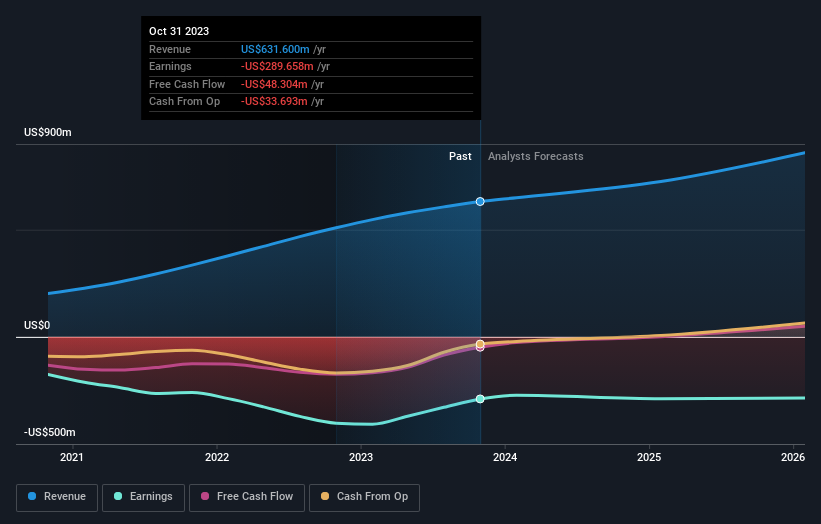Insiders have been selling Asana, Inc. (NYSE:ASAN) recently yet still hold a significant stake; 8.7% drop last week not ideal
Key Insights
Asana's significant insider ownership suggests inherent interests in company's expansion
Dustin Moskovitz owns 54% of the company
Every investor in Asana, Inc. (NYSE:ASAN) should be aware of the most powerful shareholder groups. We can see that individual insiders own the lion's share in the company with 65% ownership. That is, the group stands to benefit the most if the stock rises (or lose the most if there is a downturn).
Despite selling some shares recently, insiders control a good portion of the company's stock. As a result, the group bore the brunt of last week’s US$378m market cap loss.
Let's take a closer look to see what the different types of shareholders can tell us about Asana.
See our latest analysis for Asana
What Does The Institutional Ownership Tell Us About Asana?
Institutional investors commonly compare their own returns to the returns of a commonly followed index. So they generally do consider buying larger companies that are included in the relevant benchmark index.
As you can see, institutional investors have a fair amount of stake in Asana. This implies the analysts working for those institutions have looked at the stock and they like it. But just like anyone else, they could be wrong. If multiple institutions change their view on a stock at the same time, you could see the share price drop fast. It's therefore worth looking at Asana's earnings history below. Of course, the future is what really matters.
Asana is not owned by hedge funds. The company's CEO Dustin Moskovitz is the largest shareholder with 54% of shares outstanding. This essentially means that they have significant control over the outcome or future of the company, which is why insider ownership is usually looked upon favourably by prospective buyers. In comparison, the second and third largest shareholders hold about 9.3% and 4.1% of the stock. Interestingly, the second-largest shareholder, Justin Rosenstein is also Top Key Executive, again, pointing towards strong insider ownership amongst the company's top shareholders.
Researching institutional ownership is a good way to gauge and filter a stock's expected performance. The same can be achieved by studying analyst sentiments. Quite a few analysts cover the stock, so you could look into forecast growth quite easily.
Insider Ownership Of Asana
The definition of an insider can differ slightly between different countries, but members of the board of directors always count. Company management run the business, but the CEO will answer to the board, even if he or she is a member of it.
Most consider insider ownership a positive because it can indicate the board is well aligned with other shareholders. However, on some occasions too much power is concentrated within this group.
It seems that insiders own more than half the Asana, Inc. stock. This gives them a lot of power. Insiders own US$2.6b worth of shares in the US$3.9b company. That's extraordinary! Most would be pleased to see the board is investing alongside them. You may wish to discover if they have been buying or selling.
General Public Ownership
With a 11% ownership, the general public, mostly comprising of individual investors, have some degree of sway over Asana. This size of ownership, while considerable, may not be enough to change company policy if the decision is not in sync with other large shareholders.
Next Steps:
It's always worth thinking about the different groups who own shares in a company. But to understand Asana better, we need to consider many other factors. To that end, you should learn about the 4 warning signs we've spotted with Asana (including 1 which is potentially serious) .
But ultimately it is the future, not the past, that will determine how well the owners of this business will do. Therefore we think it advisable to take a look at this free report showing whether analysts are predicting a brighter future.
NB: Figures in this article are calculated using data from the last twelve months, which refer to the 12-month period ending on the last date of the month the financial statement is dated. This may not be consistent with full year annual report figures.
Have feedback on this article? Concerned about the content? Get in touch with us directly. Alternatively, email editorial-team (at) simplywallst.com.
This article by Simply Wall St is general in nature. We provide commentary based on historical data and analyst forecasts only using an unbiased methodology and our articles are not intended to be financial advice. It does not constitute a recommendation to buy or sell any stock, and does not take account of your objectives, or your financial situation. We aim to bring you long-term focused analysis driven by fundamental data. Note that our analysis may not factor in the latest price-sensitive company announcements or qualitative material. Simply Wall St has no position in any stocks mentioned.

 Yahoo Finance
Yahoo Finance 

